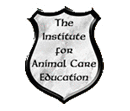This programme has been developed primarily for the members of the various regional Search and Rescue Dog Handlers Associations around Britain, although it is open to all. The aim of the diploma is to provide a structured approach to learning about dogs, keeping them healthy, recognising their needs, abilities and limitations and how to get the best out of them.
It is not designed to teach the students about the process of training dogs and handlers to carry out their SAR skills, more to enhance that training with a better understanding of dogs. The Diploma is achieved by the accumulation of three certificate courses, each individually certified by the Institute for Animal Care Education and International Society of Animal Professionals.
Course Modules
1.1 Dog Care
- Preparing to own a dog
- Choosing a dog, suitable breeds
- Exercise and basic training, toys
- Toilet training
- Vaccination and the diseases they prevent
- Parasite control including internal and external parasites
- Feeding the puppy and adult dog, the importance of good nutrition
- Neutering
1.2 Health Care
- The signs of a healthy dog, so that you can recognise when something is wrong
- Common disorders, including problems with sight, urinary disorders, disorders of the skin, bones, joints
- Nutritional disorders
- Other parasites you should be aware of
- Grooming equipment for specific coat types
1.3 First Aid
- The objectives of first aid
- Putting a first aid kit together, and the items that should go in it
- Basic rules of first aid, and correct applications of muzzles to dogs
- Vital signs, temperature, pulse and respiration. How to take these signs and the normal and abnormal signs
- First aid procedures for road accidents
- Dealing with wounds, fractures and bleeding
- Shock and unconscious dogs and how to deal with them, including artificial respiration
- Other first aid situations that may occur, such as burns, scalds, stings, foreign bodies, poisoning and fits
1.4 Introduction to Canine Communication
- Evolution of Canine Social Behaviour
- Territorial behaviour
- What is communication, and how do dogs communicate?
- The different forms of communication
- The canine senses
- The different breeds and how communication may differ

Study Level 2-3
The study Level relates to the how demanding the course is. 1 is beginner and 5 is HND / Foundation Degree level.
Reviews
No reviews were found.
